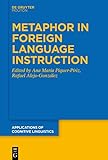Metaphor in Foreign Language Instruction / ed. by Ana María Piquer-Píriz, Rafael Alejo-González.
Material type: TextSeries: Applications of Cognitive Linguistics [ACL] ; 42Publisher: Berlin ; Boston : De Gruyter Mouton, [2019]Copyright date: ©2020Description: 1 online resource (VIII, 289 p.)Content type:
TextSeries: Applications of Cognitive Linguistics [ACL] ; 42Publisher: Berlin ; Boston : De Gruyter Mouton, [2019]Copyright date: ©2020Description: 1 online resource (VIII, 289 p.)Content type: - 9783110626735
- 9783110626872
- 9783110630367
- online - DeGruyter
- Issued also in print.
| Item type | Current library | Call number | URL | Status | Notes | Barcode | |
|---|---|---|---|---|---|---|---|
 eBook
eBook
|
Biblioteca "Angelicum" Pont. Univ. S.Tommaso d'Aquino Nuvola online | online - DeGruyter (Browse shelf(Opens below)) | Online access | Not for loan (Accesso limitato) | Accesso per gli utenti autorizzati / Access for authorized users | (dgr)9783110630367 |
Frontmatter -- Acknowledgments -- Contents -- Introduction -- Metaphor in L2 Instruction: Key Issues -- Part I. Theoretical Considerations: Reviews and Perspectives -- The Particularities of Metaphorical Experience: An Appreciation of Fiona MacArthur’s Metaphor Scholarship -- Taking Stock after Three Decades: “On Teaching Metaphor” Revisited -- Figurative Language and Young L2 Learners -- Metaphor and Spanish as a Foreign Language -- Part II. New Empirical Studies -- Part II. 1. Learners’ Use and Knowledge of L2 Figurative language -- Is Comfort Purple or Green? Word-colour Associations in the First and Second Language -- Metaphorical Reasoning in Comprehension and Translation: An Analysis of Metaphor in Multiple Translations -- Metaphorical Alignment in Cross-Cultural Office Hours’ Consultations -- Development of L2 Metaphorical Production -- Measuring Secondary-School L2 Learners Vocabulary Knowledge: Metaphorical Competence as Part of General Lexical Competence -- Part II. 2. Fostering Knowledge of L2 Figurative Language -- Using Literal Underpinnings to Help Learners Remember Figurative Idioms: Does the Connection Need to Be Crystal Clear? -- “The Manage of Two Kingdoms Must”: An Analysis of Metaphor in Two CLIL Textbooks -- An Enactment-Based Approach to the Teaching of Metaphoric Expressions: A Case of Saudi EFL Learners -- Subject Index
restricted access online access with authorization star
http://purl.org/coar/access_right/c_16ec
Exploring the role that metaphor plays in our linguistic and conceptual systems from a Cognitive Linguistics (CL)-oriented perspective has attracted a great deal of attention for the past three decades. The analysis of the applications of some theoretical tenets of CL (mainly the notion of linguistic motivation) has been particularly fruitful in foreign language (L2) instruction. However, despite some important research findings related to the presentation of word meanings as systematically connected, metaphor is still rarely included as an important part of language courses designed for L2 learners. This volume explores the important role of metaphor in L2 instruction by presenting both theoretical accounts and empirical studies into the topic. Part I comprises four theoretical chapters that touch upon issues of continuing relevance to the discipline (e.g. why metaphor is relevant for L2 learners and how it can be effectively taught) and introduce areas in need of further research (metaphor in L2 instruction in languages other than English or metaphor and young L2 learners). Part II consists of eight empirical studies that illustrate methodological challenges and best practices when analyzing metaphor in real L2 contexts.
Issued also in print.
Mode of access: Internet via World Wide Web.
In English.
Description based on online resource; title from PDF title page (publisher's Web site, viewed 25. Jun 2024)


